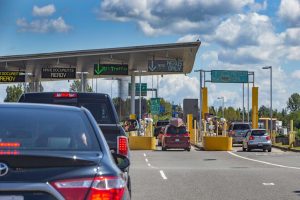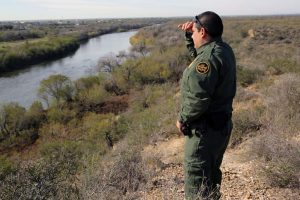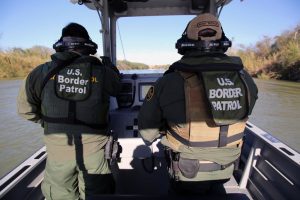
As the defenders of our national borders, Border Patrol agents with U.S. Customs and Border Protection (CBP) have one of the most important jobs in federal law enforcement. At nearly 21,000 agents strong, the uniformed law enforcement arm of the CBP is largely comprised of Border Patrol agents, who number close to 20,000, followed by specialists like air interdiction agents (597), marine interdiction agents (339), and aviation enforcement agents (296).
Border Patrol agents are frontline workers stationed throughout the nation’s 135 border patrol stations, which includes 35 immigration checkpoints.
The role of Border Patrol agent is reserved only for the most qualified and competent, and for good reason. Keeping terrorists, weapons, and drugs from entering the country through direct interdiction efforts at our international land borders and coastal waters between ports of entry is top priority for these federal law enforcement officials. On any given day, they’re arresting wanted criminals, intercepting fraudulent documents, seizing illegal narcotics and illicit or undeclared currency, and turning away hundreds of inadmissible persons. Don’t expect much downtime here; it’s an action-packed career that demands a razor-sharp focus, a steadfast sense of duty, and an unwavering commitment to the safeguarding of our nation’s borders.
A career as a Border Patrol agent is full of challenges, both mentally and physically, but you wouldn’t be interested in law enforcement if you expected an easy ride. It’s demanding and tough, but the rewards don’t get any better.
Check out what our nation’s Border Patrol agents are earning and how you can take your career (and paycheck) to the next level:
Salaries for Border Patrol Agents: Federal Pay Grades that Account for Locality and Experience
How Your Work History Can Help You Qualify for a Higher Salary
Benefits for Border Patrol Agents
Salaries for Air and Marine Agents
Salaries for Border Patrol Agents: Federal Pay Grades that Account for Locality and Experience

The CBP offers pretty solid salaries for its entry-level Border Patrol agents, along with plenty of room to grow.
The CBP recognizes the following levels for its Border Patrol agents:
- Entry-Level: GL-7, GL-9
- Journeyman: GS-11, GS-12
- Supervisory: GS-13, GS-14, GS-15
- Executive (Senior Executive Service)
Entry-level Border Patrol agents are paid in accordance with the federal Law Enforcement Officer (LEO) pay table.
Border Patrol agents are hired at the GL-7 or GL-9 level depending on background and experience, which both include ten pay steps falling within these ranges:
- GL-7: $42,273 – $53,460
- GL-9: $47,178 – $60,837
To account for cost of living differences, the LEO pay table also includes locality pay tables. In certain areas of the country, your salary may be higher than the general LEO pay table. For example, if you work in the Seattle-Tacoma metro area, your salary range at the GL-7 would be $53,695 – $67,905 – about $10,000 to $14,000 more annually than the general pay table. Check out all locality pay tables here.
Rising through the ranks as a Border Patrol agent can earn you significantly more. In fact, you can achieve a grade level promotion once you successfully complete one year at each grade level. Border Patrol agents move from the GL-9 level to the GS-11 level on the General Schedule (GS):
- GS-11: $55,204 – $71,764
- GS-12: $66,167 – $86,021
- GS-13: $78,681 – $102,288
- GS-14: $92,977 – $120,868
- GS-15: $109,366 – $142,180
Promotion beyond the GS-12 level to a supervisory position (GS-13/14/15) is based on a competitive promotion process.
It’s quite common for Border Patrol agents to earn more than their base salary when overtime and premium pay are considered. For example, work beyond your standard 40-hour work week and you’ll earn up to 25% more than your standard salary (along with locality pay). You may also qualify for premium pay if you work on a Sunday, holiday, or night shift. And if you’re recognized for your outstanding efforts, you may also qualify for a cash award.
Sure, most Border Patrol agents are on foot, but as you advance in your career, you may have the opportunity to participate in the following (and earn a bigger paycheck as a result):
- Horse Patrol
- Bike Patrol
- K-9 Unit
- Border Patrol Tactical Unit: Border Patrol agents specially trained and equipped for rapid response or deliberate deployments in situations requiring specific tactics, techniques, or procedures
- Border Patrol Search, Trauma, and Rescue: Oversees law enforcement, search and rescue, and medical responsibilities capabilities for the Border Patrol
- Mobile Response Team: Specially equipped Border Patrol agents capable of rapid movements to regional and national incidents
How Your Work History Can Help You Qualify for a Higher Salary

If you want to the opportunity to serve your country as a Border Patrol agent, you’ll need to come with the required education and/or training that will qualify you for the GL-7/9 grade level. There are four ways to qualify for this level:
- Qualifying experience: At least one year of full-time work experience comparable in level of difficulty and responsibility to grade GL-5 in the federal service; some of the areas of experience that may qualify you include compliance, corrections, security, military, emergency responder. etc.
- Graduate education: At least one year of graduate-level education beyond a bachelor’s degree in an area like criminology, criminal justice, homeland security, justice studies, law enforcement, courts and judicial systems, forensic psychology, corrections, rehabilitation, and forensic technology.
- Superior academic achievement: Bachelor’s degree from an accredited college or university in which you accomplished at least one of the following: (1) 3.0 cumulative GPA; (2) 3.5 GPA in the courses in your major field; (3) a standing in the upper third of your graduating class (documented in your official transcript); or (4) membership in a national scholastic honor society.
- Combination of education and experience: You may qualify through a combination of experience and education. Read more about how to qualify here.
If you qualify at the GL-7 level, you must also take and pass the Border Patrol entrance exam.
To qualify at the GL-9 level, you must have at least one year of full-time specialized work experience that is comparable in level of difficulty and responsibility to grade GL-7; all specialized experience must be in a law enforcement-related field.
All candidates must pass a background investigation, a physical examination, a fitness test, a polygraph exam, and a drug test. Learn more about qualifying for a Border Patrol agent job here.
Benefits for Border Patrol Agents

As federal employees, Border Patrol agents enjoy excellent benefits, which include:
- Paid time off:
- 13 to 26 days of annual leave accrued each year
- 10 federal holidays each year
- 15 days of military reserve leave
- 13 days of sick leave accrued each year
- Disabled Veteran Leave: Veterans with a service-connected disability rating of 30 percent or more from the Veterans Benefits Administration may receive up to 104 hours of disabled veteran leave for undergoing medical treatments for that disability.
- Health insurance options include:
- Federal Employees Health Benefits (FEHB) Program
- Federal Employees Dental and Vision Insurance Program (FEDVIP)
- Federal Flexible Spending Account Program (FSAFEDS)
- Federal Long Term Care Insurance Program (FLTCIP)
- Life insurance options include:
- Federal Employees Group Life Insurance (FEGLI)
- Basic Employee Death Benefit (BEDB) for FERS Employees
- Special Agents Mutual Benefit Association (SAMBA) Employee Benevolent Fund
- Retirement options include:
- Thrift Savings Plan
- FERS basic annuity (for agents who have at least 20 years of law enforcement service)
- Law enforcement retirement coverage: CBP officers qualify for 6(c) retirement coverage, which offers retirement coverage at any age after 25 years of service or at age 50 with at least 20 years of service
Salaries for Air and Marine Agents

Ready to take your career with the CBP to the next level? If you have specialized skills and credentials, you may qualify for one of the CBP’s air and marine agent jobs:
Air Interdiction Agent
To qualify for this position, you must have a current FAA Commercial or ATP Pilot Certification, and you must complete the Air and Marine Basic Training Program at the Air and Marine Operations Academy (AMOA).
Jobs in this profession start at the GS-11 grade level ($55,204 – $71,764).
Aviation Enforcement Agent
To qualify as an aviation enforcement agent, you’ll need an FAA Medical Certificate Class II or above, and you must complete the Air and Marine Basic Training Program at the Air and Marine Operations Academy (AMOA).
Jobs in this profession start at the GL-9 grade level ($47,178 – $60,837) and GS-11 grade level ($55,204 – $71,764).
Marine Interdiction Agent
To qualify as a marine interdiction agent, you’ll need at least one year of specialized law enforcement experience and a valid Coast Guard issued vessel license, and you must complete the Air and Marine Basic Training Program at the Air and Marine Operations Academy (AMOA).
Jobs in this profession start at the GL-9 grade level ($47,178 – $60,837).
Detection Enforcement Officer
To qualify as a detection enforcement officer, you’ll need specialized skills in radar usage, analysis, and interpretation, along with knowledge of air traffic control procedures, general aviation, transport and military-type aircraft, and more.
Jobs in this profession start at the GS-11 grade level ($55,204 – $71,764).


